New Delhi,
By Guest Author – Kazem Samandari
From Mumbai’s solar fields to Delhi’s think tanks, Ms. Maja Groff, international lawyer and Convenor of the Climate Governance Commission (CGC), brought with her not just a suitcase, but a suitcase full of systemic questions. During her 10-day visit to India (September 10–19, 2025), hosted by the Trajectories of Hope Foundation, she crisscrossed academia, policy circles, and media platforms with one central challenge: What if our global institutions are no longer fit for purpose—and what can we do about it before it’s too late?
With climate change, biodiversity loss, pollution, and rising geopolitical tensions reshaping the world, her visit wasn’t just an exchange of ideas—it was a call to redesign the global rulebook. Her message was clear: reform isn’t optional—it’s existential.
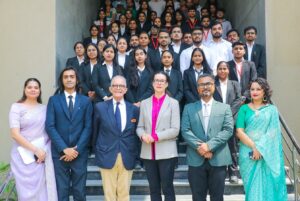 The Governance Gap: Mindset Matters
The Governance Gap: Mindset Matters
As Ms. Groff pointed out repeatedly during her visit, today’s global institutions—many designed in the mid-20th century—are creaking under the weight of 21st-century challenges. But beyond outdated architecture, she identified something deeper: a “mindset deficit“—a global reluctance to believe that meaningful solutions are still possible. Her goal was to change that narrative.
As co-winner of the New Shape Prize and Senior Treaty Advisor to Integrity Initiatives International, Ms. Groff brought both expertise and optimism to the table, engaging a broad cross-section of Indian society—from students to seasoned policy experts—on how to reignite multilateral cooperation and redesign global systems with fairness, inclusion, and accountability at their core.
 Universities as Catalysts: Learning for a Planet in Crisis
Universities as Catalysts: Learning for a Planet in Crisis
Academic institutions were at the heart of the engagement, hosting rich conversations on law, climate, peace, integrity, and ethical leadership:
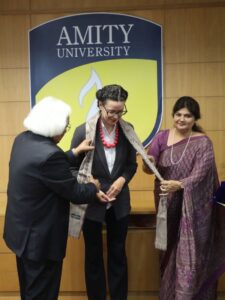 At KR Mangalam University, a session on Samrasta explored how social and religious harmony, ethical development, and cultural understanding must shape any vision of inclusive governance.
At KR Mangalam University, a session on Samrasta explored how social and religious harmony, ethical development, and cultural understanding must shape any vision of inclusive governance.- At Amity University, her keynote—Perspectives on International Peace in Our Times—connected ecological stability to the durability of peace, underscoring the need for institutional reform to secure both.
- At Jawaharlal Nehru University, a high-level academic dialogue tackled the pressing issue of Earth system governance. Despite global fragmentation, she argued, climate legitimacy can be built through justice-rooted frameworks that engage both the Global North and South.
- At Shiv Nadar School, she spoke with students and faculty on what it will take to make the United Nations fit for purpose in a drastically changed world.
- At Asian Law College, she outlined the case for an International Anti-Corruption Court, emphasizing how transparency and justice are foundational—not peripheral—to climate and development success.
- At GD Goenka University, she turned to the private sector, highlighting the transformative potential of ethical business in shaping a sustainable and just global economy.
The Business of Climate Action
In Mumbai, Ms. Groff visited Sunstream Green, a solar energy company accelerating India’s transition to renewables. The visit spotlighted how the green transition is not only an environmental imperative but a business opportunity. India’s renewable energy growth, she noted, is a case study in how sustainability and economic ambition can align when governance, innovation, and purpose converge.
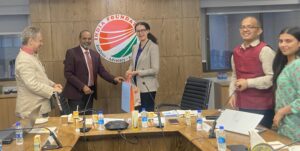 Think Tanks, Strategy, and India’s Global Role
Think Tanks, Strategy, and India’s Global Role
The program engaged with a number of India’s leading think tanks, including:
- The Manohar Parrikar Institute for Defence Studies and Analyses (IDSA)
- The Council on Energy, Environment & Water (CEEW)
- The India Foundation
- The Center for Social and Economic Progress (CSEP)
These sessions tackled climate change as a security risk, a development challenge, and—most critically—an opportunity. Rather than framing climate action as a burden on emerging economies like India, discussions emphasized how it could become a lever for cleaner energy, inclusive development, and uplifting marginalized voices. A fairer development model, shaped by the Global South, could redefine global reform narratives—and India, participants agreed, is uniquely positioned to help lead that shift.
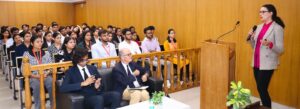 Women, Networks, and Transformational Leadership
Women, Networks, and Transformational Leadership
In her conversation with the Women Inspiring Network, Ms. Groff focused on the pivotal role of women in climate leadership. She called for more women not only at the table, but at the helm of global governance institutions—emphasizing that true resilience is built through inclusive, networked leadership.
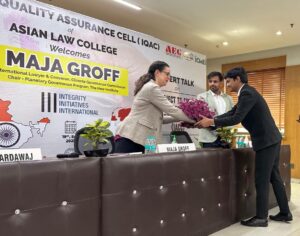 Media Engagement: Taking the Message to the Masses
Media Engagement: Taking the Message to the Masses
Ms. Groff’s message reached wider audience through media interactions with Sandeep Unnithan, Seema Dhawan, and Amit Deshpande. From exploring climate security to strengthening the rule of law, these interviews helped translate global governance reform into tangible, relatable issues for the public—reinforcing that this is not just about international law textbooks; it’s about everyday human security.

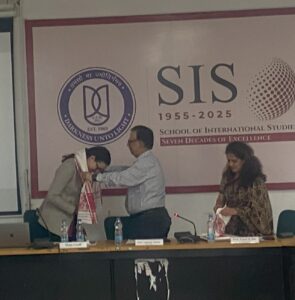 Private Receptions, Public Purpose
Private Receptions, Public Purpose
Two receptions added a personal and reflective dimension to the visit. One was hosted by my wife, Christine Samandari, and myself, and the other by the National Spiritual Assembly of the Baha’is of India. Both gatherings brought together ambassadors, scholars, diplomats, civil society leaders, and members of the Trajectories of Hope Foundation for deeper, values-driven conversations. These were not simply networking events, but opportunities to cultivate genuine dialogue, solidarity, and shared purpose across sectors and generations. The spirit of the conversations echoed the larger themes of the visit: ethical leadership, collaborative action, and hope grounded in shared responsibility.
 A Moment to Seize, A Mandate for Change
A Moment to Seize, A Mandate for Change
What made this visit exceptional was not just its scope—it was the clarity of its message: the current international order is not equipped to solve the crises it faces. Incrementalism is no longer enough. The Climate Governance Commission has laid out ambitious, practical, and inclusive reforms. The question is no longer whether we need change—but who will lead it. India, with its dynamic development trajectory, moral leadership on climate, and innovative governance experiments, is well placed to help reshape global institutions that are truly fit for the 21st century.
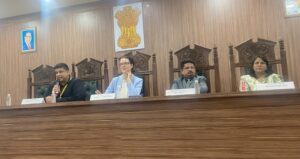 What Comes Next?
What Comes Next?
The baton has now been passed—to governments, civil society, business leaders, educators, and young changemakers. Global governance reform isn’t a distant ideal; it’s the foundation for peace, justice, and sustainability in a fragile world.
The Trajectories of Hope Foundation was proud to host Ms. Groff’s landmark visit. But the work doesn’t end here. This is only the beginning of a broader conversation—and, hopefully, a global transformation.
